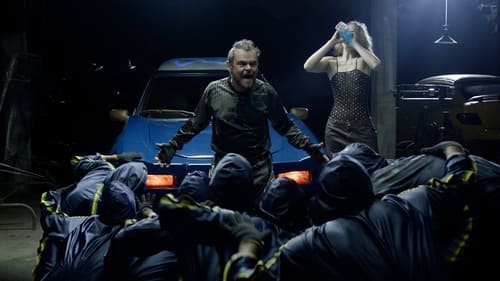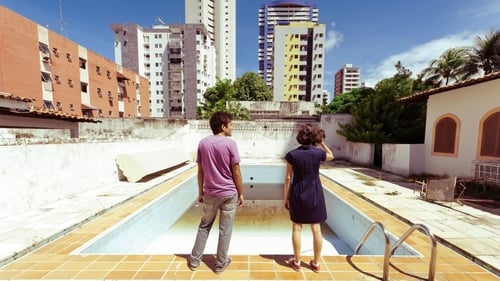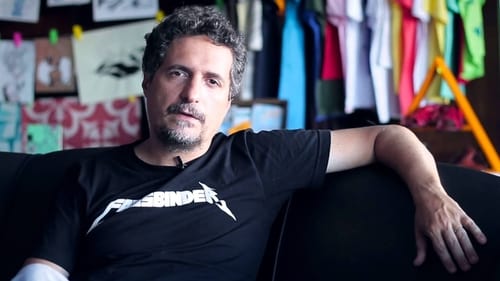
Original Music Composer
Uno has a fantastic gift: he can talk and listen to cars since he was a child. After a new law prohibiting the use of aged cars puts his father's taxi company in danger, he takes a decision to recover an old family car into a “new one”, and its name is King Car – a car that speaks, listen, and even fall in love. A car that has plans for everyone.

Original Music Composer
Mangue Beat, a musical and aesthetic movement which emerged in Pernambuco in the 1990s, transformed the visibility of the peripheries and cultural manifestations of the metropolitan area of Recife and placed the state on the map of the world music market with the launching of bands like Chico Science and Nação Zumbi and Mundo Livre S.A. The film experiments with the freedomn of thought of the Mangue using a plural language, which brings togther ideias and ideals, refleting the daring which resulted in the great symbol of the movement: a satellite dish planted in the mud of the estuaries - the Mangue.

Music
Curral is a political drama set in the rural Brazilian city of Gravatá. During the mayoral elections, the population is divided between the Blue and Red parties, two political oligarchies fighting each other for power. A recent severe drought means water is the main bargaining chip when it comes to securing a majority of people's votes. Chico Caixa is a former city employee. He lost his job trying to take water supplies to a poor neighborhood which had been abandoned for political reasons. Caixa is invited by a childhood partner, Joel, to work on his councilor campaign. Joel presents himself as a new alternative to the older candidates, who have been in power for decades. But as the campaign progresses, Chico Caixa soon realizes that breaking apart from the established political game is not always as easy as it may seem

Music
Passages showcases Brazilian films in which the utilisation of artforms and media such as literature, painting, theatre, music, photography, radio and television, functions as a 'passage' to political and social reality.

Passages showcases Brazilian films in which the utilisation of artforms and media such as literature, painting, theatre, music, photography, radio and television, functions as a 'passage' to political and social reality.

Original Music Composer
In 2027 Brazil, civil servant Joana mainly deals with divorce cases. As a member of a branch of evangelical Christians known as the Divino Amor group, she uses her position to offer a kind of physical therapy to couples who want to separate. Although Joana and her husband Danilo regularly consummate their marriage, neither her constant prayers nor any other methods of assistance seem to be able to fulfill their desire for a child.

Original Music Composer
A countercultural movement that took place at Ipanema Pier marked the history of all participants. Painters, musicians, actors, surfers and others came together to change the system through peaceful demonstrations, including drugs, sex and new experiences. After decades of events, the main participants recall the events.

Writer

Original Music Composer
Élvio and Eric live alone in a small apartment without talking to anyone else. The relationship between the two deteriorates until one day, mysteriously, a periscope appears in the room.

Sound
The boy runs after the ball. The worker builds concrete dreams between buildings and soccer balls in a lowland field in Recife. The poet receives a word ball, gives a literal stroke and makes an imaginary goal in this film about football, passion and poetry. João Cabral's America goes beyond the four lines of the field or paper, it transcends time and the field; update the memory to the fact that the love of football will not be volatile or ephemeral, neither in defeat nor in victory.

Original Music Composer
Paulete, the star of a daring theater group, is visited by his military brother-in-law, the young Fininha. A torrid relationship arises between the two, and now the soldier must deal with the prevailing repression during the Brazilian military dictatorship.

Music
Shelly, a young dancer who dreams of becoming a singer, and Jaqueline, an experienced singer who has had some successes and bitter the decline of her career, are partners in a brash band in a scenario that It mixes the romanticism and the sensuality of the Brazilian periphery. Inserted in the universe of show business, between nightclubs and local TV shows, they discover that everything is disposable, like success, love and other human relations. Together, they seem to form a single trajectory of life, where Shelly represents the past of Jaqueline, while this figure like the probable future of the colleague.

Original Music Composer
Life in a middle-class neighbourhood in present day Recife, Brazil, takes an unexpected turn after the arrival of an independent private security firm. The presence of these men brings a sense of safety and a good deal of anxiety to a culture which runs on fear. Meanwhile, Bia, married and mother of two, must find a way to deal with the constant barking and howling of her neighbour’s dog. A slice of ‘Braziliana’, a reflection on history, violence and noise.

Music
For more than 50 years, Durvinha and Moreno hid their real identity even to their own children, who grew up thinking their parents' names were Jovina Maria and Jose Antonio Souto. They had belonged to the gang of the most famous Brazilian bandit's leader. The truth was revealed when Moreno, at the age of 95, decided to share the weight of memories with his children and meet alive relatives, including his first child. The 'cangaceirismo' was a form of 'social banditry' born in northeastern Brazil in the early XX century in a scenario of extreme poverty, violence and anarchy.

Original Music Composer
Seventy critics and filmmakers discuss cinema around the conflict between the artist and the observer, the creator and the critic. Between 1998 and 2007, Kléber Mendonça Filho recorded testimonies about this relationship in Brazil, the United States and Europe, based on his experience as a critic.

Original Music Composer
A small poor community called Javé is under threat of being flooded by a new dam that is being built, and the only way to prevent this is to prove the town's historical value. As most of the inhabitants are illiterate, they have no choice but to ask for the help of Antônio Biá, a man who has been ostracized ever since it was discovered that he had sent out letters with lies about their reputations as a way to keep his job in Javé's seldom-used post office. He now has the task of documenting people's memories of how the city was founded, yet each inhabitant has his or her own version of what happened.

Music
A documentary that focuses on two young male inhabitants of Recife (statistically, the fourth worst city in the world to live in) who have both reacted strongly to their situation. One has become a drummer in a rap/rock band. The other has killed forty-four people and is now in jail. Both use the term "Wicked Souls" to describe their enemies.

Original Music Composer
Scenes of the childhood of a girl, living in a small Brazilian town.

Music
The history of Simião Martiniano.















